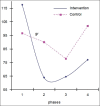Family-based intervention for controlling childhood obesity: an experience among Iranian children
- PMID: 23626894
- PMCID: PMC3634176
Family-based intervention for controlling childhood obesity: an experience among Iranian children
Abstract
Background: Treatment of childhood obesity is difficult, and successful management may differ in various areas with different cultural backgrounds. The present study was conducted to assess the effect of lifestyle modification family-based intervention in young Iranian children.
Methods: This field trial study was conducted in 2011 among 156 obese children in Tehran, Iran. They were randomly assigned to intervention and control groups. At baseline, anthropometric measurements and biochemical analysis were performed. The second and third phases consisted of training sessions for parents of the intervention group. At the fourth phase, there was no training program. In all four phases, questionnaires on demographic characteristics, lifestyle and food frequency were completed by interviewing with mothers, and biochemical analysis was repeated at the end of the study.
Results: During the second and third phases of the study, weight and height increased significantly in both groups, although weight increased more slowly, and waist and hip circumferences was decreased in the intervention group. Serum triglycerides and cholesterol decreased significantly in the intervention group (P < 0.05). Analysis of food group consumption showed that in the intervention group, not only consumption of milk, dairy and nuts group increased significantly but also the corresponding figure decreased for bread and cereals, sugar and confectionery ingredients; moreover, the family's oil and fat consumption decreased significantly (P < 0.05). Watching TV and playing on the computer decreased significantly in the intervention group; however, walking time increased significantly in both groups (P < 0.05).
Conclusions: The family-based lifestyle program had limited but desirable effects on anthropometric and metabolic outcomes of the obese children. We suggest that a longer period of intervention may have more favorable results.
Keywords: Children; family-based intervention; obesity.
Conflict of interest statement
Figures
References
-
- Tsiros MD, Sinn N, Coates AM, Howe PR, Buckley JD. Treatment of adolescent overweight and obesity. Eur J Pediatr. 2008;167:9–16. - PubMed
-
- de Onis M, Blössner M, Borghi E. Global prevalence and trends of overweight and obesity among preschool children. Am J Clin Nutr. 2010;92:1257–64. - PubMed
-
- Discigil G, Tekin N, Soylemez A. Obesity in Turkish children and adolescents: Prevalence and non-nutritional correlates in an urban sample. Child Care Health Dev. 2009;35:153–8. - PubMed
LinkOut - more resources
Full Text Sources


